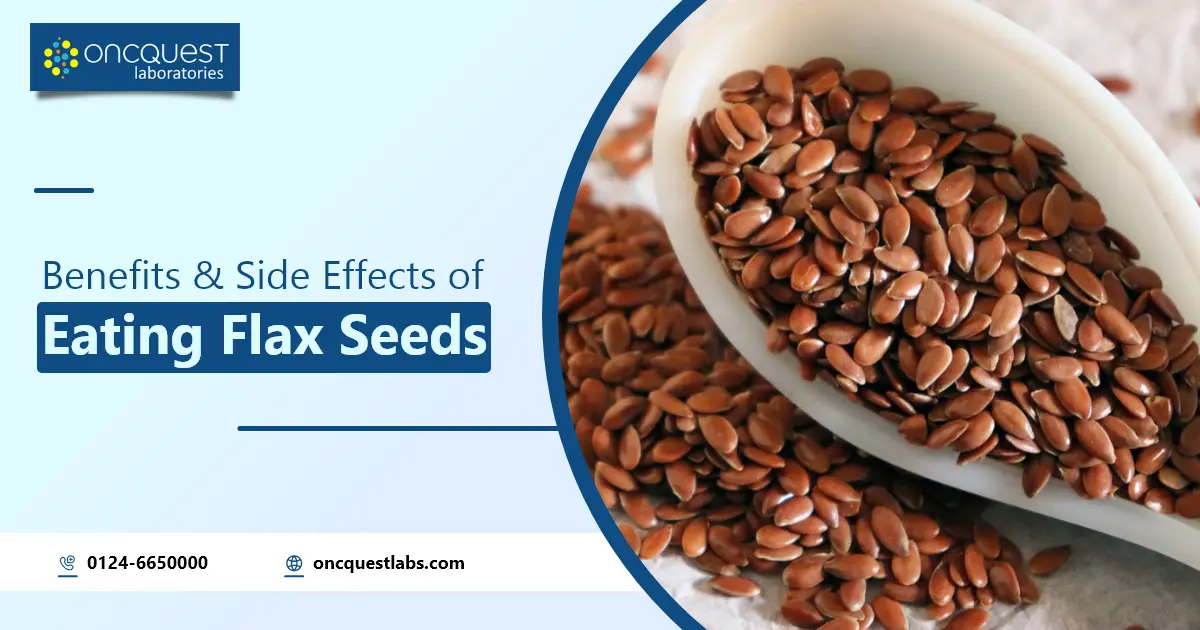Due to the many health benefits hidden in the small flax seeds , this healthy food has gained the status of a superfood. Flax seeds are produced from the flax plant found in the Indian subcontinent. Its seeds are rich in fibre, omega-3 fatty acids, and many nutrients like lignans, which are helpful for the overall health benefits of our body. Also, its seeds are used to make many types of delicious dishes, beverages, salads, etc. Flax seeds can be consumed straightforwardly also. You can also eat its seeds directly, extract its oil, and use it, or you can also consume it by grinding it with flour.
Flax seeds are considered the best for heart-related diseases, providing essential fatty acids to the body and taking care of the digestive system. The antioxidant properties present in it help keep the blood in our body clean and also take care of our skin. Through our blog today, we will tell you in detail the benefits and side effects of consuming flax seeds and will also provide complete information related to their intake quantity and the correct method of including them in your daily diet. If you also want to keep your health good with its seeds, then definitely read the complete information given in this blog.
Contents
Nutritional Value of Flax Seeds
It contains a lot of nutrients that help keep us healthy. This superfood not only make our daily diet delicious but also protect our overall health. Information about the various nutritional elements found in it is given below:
- Omega-3 Fatty Acids:
Flax seeds are most effective in providing relief from any kind of injury or inflammation caused by any other reason. It also keeps the heart healthy and prevents fatal heart diseases in the future.
- Rich Amount of Fibre:
Fibre is the most useful nutrient for keeping our digestive system safe. The fibre found in it keeps our weight under control and also controls unnecessary hunger.
- Full of Protein:
Flax seeds are rich in protein. This protein repairs the damaged muscles present in our body and is also helpful in building new muscles.
- Storehouse of Minerals:
Minerals like iron, magnesium, and calcium make flaxseed a superfood. All these minerals strengthen the bones in our body and also protect us from many other deadly diseases.
Below is a table of nutrients found in flaxseeds, so you can know the amount of all the nutrients.
| Nutrient | Amount Per 100 grams |
| Calories | 533 kcal |
| Total Fat | 42 g |
| Saturated Fat | 3.7 g |
| Polyunsaturated Fat | 29 g |
| Monounsaturated Fat | 8 g |
| Sodium | 30 mg |
| Potassium | 813 mg |
| Total Carbohydrate | 29 g |
| Dietary Fiber | 27 g |
| Protein | 18 g |
| Calcium | 255 mg |
| Iron | 5.7 mg |
| Vitamin B6 | 0.5 mg |
Health Benefits Of Flax Seeds
The nutrients found in flax seeds provide various health benefits to the body and enhance the taste of your food. Two main health benefits from the vitamins and minerals present in it are given below.
Prevention Of Heart Diseases And Body Weight Control
Flax seeds contain abundant amounts of omega-3 fatty acids, which help keep our hearts healthy and also prevent many types of life-threatening diseases. It also controls the cholesterol level in the body and keeps the blood flow in the arteries smooth. The fibre in it controls our appetite, which also helps with weight control.
Improves The Digestive System And Is Beneficial For Diabetic Patients
Flax seeds are also beneficial for people suffering from diabetes. It keeps the blood sugar level stable and also cleans the blood. Also, the nutrients present in it keep our digestive system safe, and the fibre present in it provides us with high energy. Its seeds have many other health benefits, due to which they must be included in your diet. Its consumption not only protects us from many types of deadly diseases, but it also makes our food more delicious.
Rich in Omega-3 Fatty Acids
Flax seeds are exceptionally rich in alpha-linolenic acid (ALA), a type of omega-3 fatty acid essential for heart health and inflammation reduction. ALA is known for its cardiovascular benefits, such as lowering blood pressure and reducing the risk of heart disease. As a plant-based source, flax seeds provide a valuable alternative for those seeking to increase omega-3 intake without consuming fish. Regular consumption of flax seeds can contribute to a balanced diet that supports overall health, particularly in promoting a healthy heart and combating inflammatory conditions.
May Reduce Cancer Risk
Flax seeds may reduce the risk of cancer due to their high content of lignans, plant compounds with antioxidant and estrogenic properties. These lignans have been studied for their potential to block enzymes involved in hormone metabolism, which may help reduce the risk of hormone-related cancers such as breast, prostate, and colon cancer. Additionally, the omega-3 fatty acids in flax seeds contribute to anti-inflammatory effects that can inhibit tumor growth and support overall cellular health. Incorporating flax seeds into a balanced diet may therefore offer protective benefits against certain types of cancer.
Improves Skin Health
Flax seeds contribute to improved skin health through several mechanisms. Their rich content of omega-3 fatty acids helps to maintain skin hydration and elasticity, reducing the appearance of wrinkles and promoting a youthful complexion. The anti-inflammatory properties of these fatty acids can also alleviate skin conditions like acne, eczema, and psoriasis. Additionally, flax seeds contain lignans and antioxidants that protect skin cells from damage caused by free radicals and environmental stressors. Regular consumption of flax seeds or use of flaxseed oil in skincare routines can help achieve clearer, smoother, and healthier-looking skin.
Supports Bone Health
Flax seeds support bone health primarily through their impressive array of nutrients. They are rich in essential minerals such as calcium, magnesium, and phosphorus, which are crucial for maintaining strong and healthy bones. These minerals contribute to bone density and strength, reducing the risk of osteoporosis and fractures. Additionally, flax seeds contain omega-3 fatty acids and lignans, which have anti-inflammatory properties that may help reduce bone loss and support overall bone health. Incorporating flax seeds into your diet can provide valuable nutrients that support bone density and promote long-term skeletal health.
How to Consume Flaxseed?
Flaxseed, which is rich in fibre, omega-3 fatty acids and other important minerals, provides many health benefits. You can include it in your daily diet and protect your body from many types of diseases with the nutrients present in it. You can consume it in the following way:
Method of Consuming Flaxseed:
- It can be consumed along with curd, salad or other cereals.
- You can also add it to many dishes by making powder of the seeds and you can also take it by mixing it in soup or smoothie.
- Grinding flaxseeds and extracting their oil is also beneficial, and you can also use it for salad dressing.
- You can also consume its oil by sprinkling it on dishes or vegetables.
- You can also enjoy its taste and get health benefits by mixing it in sauces or dips.
You can consume flaxseed in many ways as per your comfort. It keeps your weight under control, protects you from heart disease and also reduces the risk of diabetes. Along with health benefits, it also makes our food more delicious. The oil from its seeds is also beneficial for hair health and it also takes care of the skin.
Side Effects of Flax Seeds
It is a health-enhancing food that has many benefits, but in some cases, its side effects can also be seen on the body. It should be consumed regularly in an appropriate quantity. If you are suffering from any long-term illness and are taking medicines, then before taking them, consult your doctor. You must take the following precautions before taking it:.
Possible Side Effects of Excessive Consumption:
- If you take it in excess, then you may have to face problems like constipation, gas, acidity, and flatulence.
- If you are taking medicines due to any long-term illness, then in that case the risk of allergy increases.
- Consumption of too many flax seeds thins the blood of the body, which also increases the risk of many other diseases.
Precautions Before Consumption:
- Keep in mind that flax seeds should be consumed in controlled quantities. Generally, one or two spoons of powder a day is enough for a healthy person.
- If you have a special health condition and have been taking medicines for a long time, then consult your doctor first.
- If you are taking it for the first time, then start with a small dose and increase it slowly.
Conclusion
Flaxseed, which has the status of a superfood, is not only beneficial for health, but the nutrients present in it also protect us from many types of fatal and life-threatening diseases. You can use its oil for hair care, it also brightens your skin. The minerals present in it keep your heart healthy and also control diabetes. Its regular consumption also controls your weight and protects your digestive system. If you are suffering from any long-term disease, then consult your doctor before consuming it.
Frequently Asked Questions (FAQs)
How much flaxseed should be consumed?
If you are using it in powder form, then 1 to 2 tablespoons per day is appropriate for a person of normal health. You can use the oil made from its seeds in food as per taste.
Can flaxseeds be consumed directly without making powder?
Of course, you can eat these seeds directly, but consuming them in the form of powder is more beneficial.
How can flax seed oil be consumed?
You can apply its oil directly to the skin or hair, and you can also make salad dressing from it or mix it in dips and sauces.
Do flax seeds and oil have any health problems?
Of course, if you consume it in excess, you may have to face many types of health problems. Consuming it in excess can lead to symptoms like diarrhoea, allergies, or flatulence.





